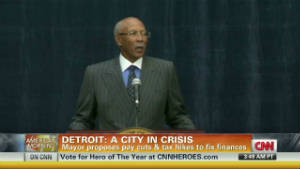Economist: Without big reforms, Detroit will default in 4 months, file bankruptcy
updated 6:29 PM EST, Thu November 17, 2011

Detroit Mayor David Bing says the city faces "the potential cash shortfall of $45 million by the end of the fiscal year,."
STORY HIGHLIGHTS
- Economist David L. Littmann: "Modest changes are not going to be sufficient"
- Mayor Dave Bing proposes major cuts and reforms to keep Detroit out of bankruptcy
- Bing: "If we want to succeed, all of us have to put some skin in the game."
- Detroit is the only major U.S. city with a credit rating below investment grade right now
The home to America's Big Three automakers has until spring to straighten out its budget problems or the city could face bankruptcy or, worse, potential default on its largest debt obligations.
"Without change, the city could run out of cash by April, with the potential cash shortfall of $45 million by the end of the fiscal year," Mayor Dave Bing said in an address to Detroit residents Wednesday night.
The mayor said $40 million could be saved in the city's budget through pension reform, cuts to medical care costs, and strategic layoffs -- all key points in the budget reform proposal he announced in the televised speech.
While many government jobs are on the chopping block under the mayor's proposal, many more could be lost if major changes are not made to the government's deficit, warns David L. Littmann, senior economist with the Mackinac Center for Public Policy.
 Detroit mayor's plan to save the city
Detroit mayor's plan to save the city Going into default could result in the shutdown of public works such as garbage collection and public transportation.
Littmann also said that if the mayor's proposal is not approved, it will "100%" file for bankruptcy. If the city fails to overhaul its budget, it's not a matter of if the city will file for bankruptcy, it's when, he said.
Over 30 years in the city, Littmann has worked on Detroit's budgetary issues on many occasions as a consultant to the government. He said Detroit's current budget problems have been decades in the making.
"The City Council has to come to some sort of agreement on these contracts and what they're going to do. It's the 11th hour and the 12th is coming," he warned.
Fortune: Detroit slips in the small-car race
The city's Planning and Economic Development Committee began reviewing Bing's proposal Thursday morning. Littmann said it usually takes a few weeks for budget proposals to push through if there aren't any roadblocks.
It's critical that the unions get behind the proposal, Bing told residents: "If we want to succeed, all of us have to put some skin in the game."
Asked how he's going to get the unions on board with such drastic cuts to wages and health care, he warned that if the unions don't come to the table on this, the state could send in an emergency manager who could "fire everybody, quite frankly, and start from scratch."
The mayor has taken much heat in the local press about potential layoffs to police and fire forces around the city, especially since Detroit has one of the highest crime rates in the nation.
"I think that police and fire are the last people that I want to lay off. We have a horrendous problem from a crime standpoint in this city," Bing said Thursday on CNN's "American Morning."
While city job cuts may be necessary, Bing said he does not want "massive layoffs" because that would result in "chaos in the city of Detroit."
He said in his speech that police and fire departments together compose about 60% of the city's budget dollars. If those departments agree to 10% wage cuts, the government could save $13 million, he said.
On CNN, Bing also defended himself against an editorial in the Detroit News that said the cuts outlined in the budget proposal are "not deep enough, wide enough or bold enough."
"If they can do it better than us, I invite them to come in. They don't know what the hell they are talking about," he said.
The proposal includes 10% cuts to employees' salaries across the board, a 10% increase in employee contributions to their health care coverage, cuts to pension plans, and a tax rate increase of less than 1% on corporations in Detroit starting in 2012.
In his interview with CNN, the mayor refused to put a number on the potential layoffs the city's workforce could face under his proposal. But he mentioned in his speech the night before that since he took office, 2,000 jobs have been cut from city government.
Detroit is the only major U.S. city with a credit rating below investment grade right now, according to the Moody's ratings agency. There has been some optimism about businesses returning to Detroit since the recession, but Littmann said it's a "dead cat bounce."
"Anything falls from a 100 story building, it's going to bounce for a little bit, but on its (Detroit's) own, given the policies, it's not going to survive as a fiscally viable entity," he explained.
If Detroit were to file for bankruptcy, it would join Jefferson County, Alabama, which earlier this month became the largest municipality to file for bankruptcy in U.S. history. Harrisburg, Pennsylvania, and Central Falls, Rhode Island, have also filed for bankruptcy protection this year.
Moody's says Detroit is on its list of 26 municipalities with what it calls "speculative grade ratings" -- in other words, the city's debt has been labeled "junk bond" status. Of the 14,000 municipalities Moody's rates, less than 1% are on this list.
No comments:
Post a Comment